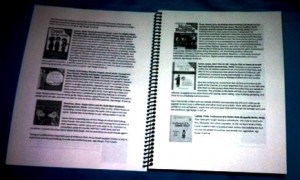“I read the other day some verses written by an eminent painter which were original and not conventional. Always the soul hears an admonition in such lines, let the subject be what it may. The sentiment they instill is of more value than any thought they may contain. To believe your own thought, to believe that what is true for you in your private heart is true for all men–that is genius. Speak your latent conviction, and it shall be universal sense; for always the inmost becomes the outmost-and our first thought is rendered back to us by the trumpets of the Last Judgment. Familiar as the voice of the mind is to each, the highest merit we ascribe to Moses, Plato and Milton is that they set at naught books and traditions, and spoke not what men, but what they thought. A man should learn to detect and watch that gleam of light which flashes across his mind from within, more than the lustre of the firmament of bards and sages. Yet he dismisses without notice his thought, because it is his.
“In every work of genius we recognize our own rejected thoughts; they come back to us with a certain alienated majesty.
“Great works of art have no more affecting lesson for us than this. They teach us to abide by our spontaneous impression with good humored inflexibility then most when the whole cry of voices is on the other side. Else tomorrow a stranger will say with masterly good sense precisely what we have thought and felt all the time, and we shall be forced to take with shame our own opinion from another.
“There is a time in every man’s education when he arrives at the conviction that envy is ignorance; that imitation is suicide; that he must take himself for better for worse as his portion; that though the wide universe is full of good, no kernel of nourishing corn can come to him but through his toil bestowed on that plot of ground which is given to him to till. The power which resides in him is new in nature, and none but he knows what that is which he can do, nor does he know until he has tried. Not for nothing one face, one character, one fact, makes much impression on him, and another none. It is not without pre-established harmony, this sculpture in the memory. The eye was placed where one ray should fall, that it might testify of that particular ray. Bravely let him speak the utmost syllable of his confession. We but half express ourselves, and are ashamed of that divine idea which each of us represents. It may be safely trusted as proportionate and of good issues, so it be faithfully imparted, but God will not have his work made manifest by cowards. It needs a divine man to exhibit anything divine. A man is relieved and gay [ joyful (original meaning) ] when he has put his heart into his work and done his best; but what he has said or done otherwise shall give him no peace. It is a deliverance which does not deliver. In the attempt his genius deserts him; no muse befriends; no invention, no hope.
“Trust thyself: every heart vibrates to that iron string. Accept the place the divine providence has found for you, the society of your contemporaries, the connexion of events. Great men have always done so, and confided themselves childlike to the genius of their age, betraying their perception that the Eternal was stirring at their heart, working through their hands, predominating in all their being. And we are now men, and must accept in the highest mind the same transcendent destiny; and not pinched in a corner, not cowards fleeing before a revolution, but redeemers and benefactors, pious aspirants to be noble clay under the Almighty effort let us advance on Chaos and the Dark….
“These are the voices which we hear in solitude, but they grow faint and inaudible as we enter into the world. Society everywhere is in conspiracy against the manhood of every one of its members. Society is a joint stock company, in which the members agree, for the better securing of his bread to each shareholder, to surrender the liberty and culture of the eater. The virtue in most request is conformity. Self-reliance is its aversion. It loves not realities and creators, but names and customs.
“Whoso would be a man, must be a nonconformist. He who would gather immortal palms must not be hindered by the name of goodness, but must explore if it be goodness. Nothing is at last sacred but the integrity of our own mind. Absolve you to yourself, and you shall have the suffrage of the world. I remember an answer which when quite young I was prompted to make to a valued adviser who was wont to importune me with the dear old doctrines of the church. On my saying, What have I to do with the sacredness of traditions, if I live wholly from within? My friend suggested,-“But these impulses may be from below, not from above.” I replied, “They do not seem to me to be such; but if I am the devil’s child, I will live then from the devil.” No law can be sacred to me but that of my nature. Good and bad are but names very readily transferable to that or this; the only right is what is after my constitution; the only wrong what is against it. A man is to carry himself in the presence of all opposition as if every thing were titular and ephemeral but he. I am ashamed to think how easily we capitulate to badges and names, to large societies and dead institutions. Every decent and well spoken individual affects and sways me more than is right. I ought to go upright and vital, and speak the rude truth in all ways….
“What I must do is all that concerns me, not what the people think. This rule, equally arduous in actual and in intellectual life, may serve for the whole distinction between greatness and meanness. It is the harder because you will always find those who think they know what is your duty better than you know it. It is easy in the world to live after the world’s opinion; it is easy in solitude to live after our own; but the great man is he who in the midst of the crowd keeps with perfect sweetness the independence of solitude.
“The objection to conforming to usages that have become dead to you is that it scatters your force. It loses your time and blurs the impression of your character. If you maintain a dead church, contribute to a dead Bible Society, vote with a great party either for the Government or against it, spread your table like base housekeepers,-under all these screens I have difficulty to detect the precise man you are. And of course so much force is withdrawn from your proper life. But do your thing, and I shall know you. Do your work, and you shall reinforce yourself. A man must consider what a blindman’s buff is this game of conformity. If I know your sect I anticipate your argument. I hear a preacher announce for his text and topic the expediency of one of the institutions of his church. Do I not know beforehand that not possibly can he say a new and spontaneous word? . . . Well, most men have bound their eyes with one or another handkerchief, and attached themselves to some one of these communities of opinion. This conformity makes them not false in a few particulars, authors of a few lies, but false in all particulars. Their every truth is not quite true. Their two is not the real two, their four not the real four: so that every word they say chagrins us and we know not where to begin to set them right. Meantime nature is not slow to equip us in the prison uniform of the party to which we adhere. We come to wear one cut of face and figure, and acquire by degrees the gentlest asinine expression. There is a mortifying experience in particular, which does not fail to wreak itself also in the general history; I mean “the foolish face of praise,” the forced smile which we put on in company where we do not feel at ease, in answer to conversation which does not interest us. The muscles, not spontaneously moved but moved by a low usurping willfullness, grow tight about the outline of the face, and make the most disagreeable sensation; a sensation of rebuke and warning which no brave young man will suffer twice.
“For non conformity. the world whips you with its displeasure…. It is easy enough for a firm man who knows the world to brook the rage of the cultivated classes. Their rage is decorous and prudent, for they are timid, as being very vulnerable themselves. But when to their feminine rage the indignation of the people is added, when the ignorant and the poor are aroused, when the unintelligent brute force that lies at the bottom of society is made to growl and mow, it needs the habit of magnanimity and religion to treat it godlike as a trifle of no concernment.
“The other terror that scares us from self trust is our consistency; a reverence for our past act or word because the eyes of others have no other data for computing our orbit than our past acts, and we are loath to disappoint them.
“But why should you keep your head over your shoulder? Why drag about this monstrous corpse of your memory, lest you contradict somewhat you have stated in this or that public place? Suppose you should contradict yourself; what then?
“A foolish consistency is the hobgoblin of little minds, adored by little statesmen and philosophers and divines. With consistency a great soul has simply nothing to do. He may as well concern himself with his shadow on the wall. Out upon your guarded lips! Sew them up with packthread, do. Else if you would be a man speak what you think today in words as hard as cannon balls, and tomorrow speak what tomorrow thinks in hard words again, though it contradict everything you said today. Ah, then, exclaim the aged ladies, you shall be sure to be misunderstood! Misunderstood! It is a right fool’s word. Is it so bad then to be misunderstood? Pythagoras was misunderstood, and Socrates, and Jesus, and Luther, and Copernicus, and Galileo, and Newton, and every pure and wise spirit that ever took flesh. To be great is to be misunderstood…. ”
~Ralph Waldo Emerson
—————————————————-
A little perspective….
Eric Dyson and Cornell West
Michael Jackson and Grandma
All Donations currently are being used to publish the “Words and Violence” Compendium, a project with more than 600 pages of resources about bullying with words– from the playground to the media. The Compendia will be shared with schools, childrens’ programs, educators and other supporters.
“Words and Violence” studies the impact of words when used as weapons to promote violence.
The work is dedicated to Michael Jackson and Lady Diana Spencer.




